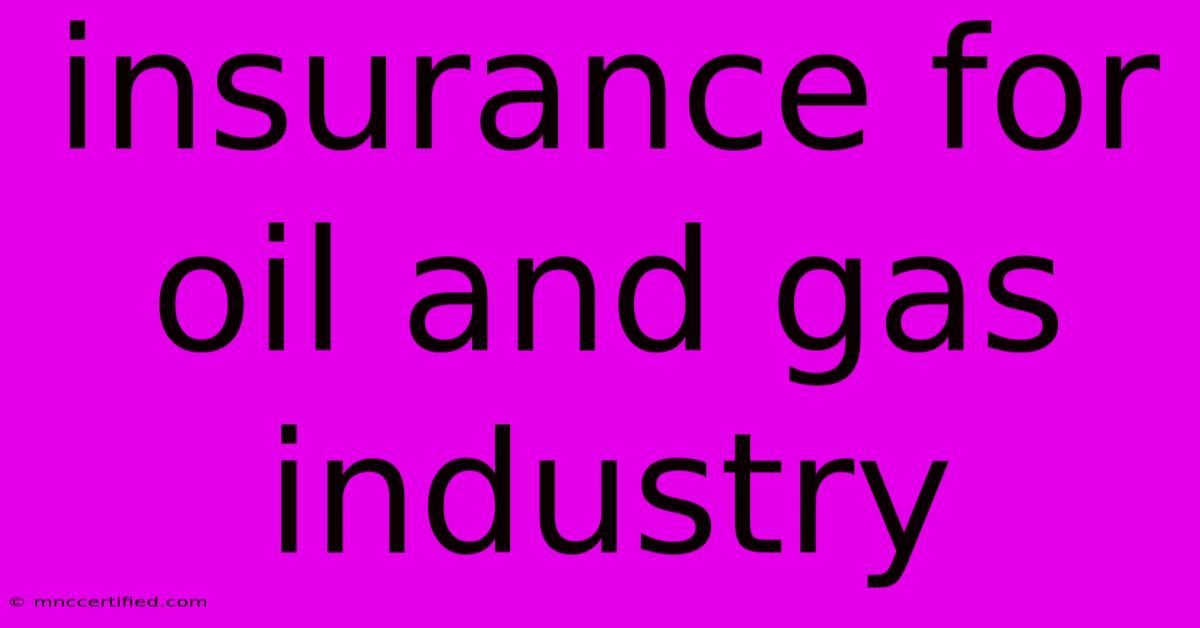Insurance For Oil And Gas Industry

Table of Contents
Insurance for the Oil and Gas Industry: A Comprehensive Guide
The oil and gas industry is inherently risky. From volatile energy prices to the complex machinery and hazardous materials involved, the potential for significant financial losses is substantial. This is why comprehensive insurance is not just recommended, it's absolutely crucial for companies of all sizes operating within this sector. This guide explores the various types of insurance essential for oil and gas businesses, highlighting key considerations and helping you navigate this complex landscape.
Understanding the Unique Risks of the Oil and Gas Industry
Before diving into specific insurance types, it's vital to understand the unique hazards faced by oil and gas companies. These risks can be broadly categorized as:
- Operational Risks: These include accidents during drilling, production, transportation, and refining. This can encompass equipment failure, explosions, spills, fires, and worker injuries, leading to substantial liability claims and property damage.
- Environmental Risks: Oil and gas operations carry a significant environmental footprint. Spills, leaks, and pollution can result in massive clean-up costs, hefty fines, and reputational damage. Environmental liability insurance is paramount.
- Political and Regulatory Risks: Government regulations, political instability in operating regions, and changes in energy policy can significantly impact profitability and operations. This often necessitates specialized political risk insurance.
- Financial Risks: Fluctuations in commodity prices, project delays, and unforeseen costs can cripple even the most established companies. Financial risk management strategies, including appropriate insurance, are crucial.
Essential Insurance Types for Oil and Gas Companies
Given these risks, a robust insurance program needs to cover multiple areas. Here are some essential types of insurance:
1. Liability Insurance:
- General Liability: Protects against third-party claims for bodily injury or property damage caused by your operations. This is a foundational policy for any oil and gas company.
- Professional Liability (Errors & Omissions): Covers claims arising from professional negligence or mistakes in design, engineering, or consulting services.
- Environmental Impairment Liability (EIL): This crucial coverage protects against claims resulting from environmental damage caused by your operations, including pollution and contamination. This often covers remediation costs and legal fees.
- Product Liability: Covers claims arising from defects in products supplied by your company.
2. Property Insurance:
This covers damage to your physical assets, including:
- Drilling rigs and platforms: Protection against damage or loss due to accidents, natural disasters, or other unforeseen events.
- Pipelines and transportation infrastructure: Insurance for damage to pipelines, tankers, and other transportation assets.
- Processing facilities and refineries: Comprehensive coverage for damage to refining plants and processing equipment.
3. Workers' Compensation Insurance:
This is legally mandated in most jurisdictions and covers medical expenses and lost wages for employees injured on the job. This is a non-negotiable aspect of operating in the oil and gas industry.
4. Marine Insurance (for Offshore Operations):
Covers risks associated with marine transportation, including damage to vessels, cargo loss, and liability for marine accidents. This is especially critical for offshore drilling and production operations.
5. Business Interruption Insurance:
This covers lost revenue and expenses incurred due to business disruptions caused by insured perils, allowing the company to continue operating during unforeseen circumstances.
6. Political Risk Insurance:
This protects against losses due to political instability, expropriation, or other political events in the regions where your company operates. This is particularly relevant for international operations.
Choosing the Right Insurance Provider
Selecting the right insurance provider is crucial. Look for insurers with:
- Extensive experience in the oil and gas industry: Their understanding of the specific risks is paramount.
- Strong financial stability: Ensures the insurer can meet its obligations in case of a claim.
- A comprehensive policy: One that adequately covers all the potential risks your business faces.
- Competitive pricing: While cost is a factor, don't compromise on coverage.
Conclusion:
Insurance is not merely an expense for oil and gas companies; it's a critical investment in risk mitigation and business continuity. A comprehensive insurance program, tailored to your specific operations and risk profile, is essential for protecting your assets, your employees, and your future. Consult with experienced insurance brokers specializing in the energy sector to develop a robust and effective strategy. Understanding the nuances of each policy and ensuring adequate coverage are vital for navigating the inherent complexities and potential financial implications of operating within the oil and gas industry.

Thank you for visiting our website wich cover about Insurance For Oil And Gas Industry. We hope the information provided has been useful to you. Feel free to contact us if you have any questions or need further assistance. See you next time and dont miss to bookmark.
Featured Posts
-
Jazz Top Mavericks On Collins Final Dunk
Nov 16, 2024
-
Hs Rail Line Madrid Lisbon 2030
Nov 16, 2024
-
Addressing Foreign Bribery In Portugal
Nov 16, 2024
-
Explained Cobra Kai Season 6 Part 2 Finale
Nov 16, 2024
-
Disney Stock Price Levels To Watch
Nov 16, 2024